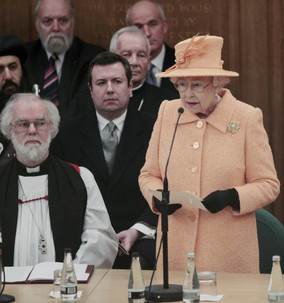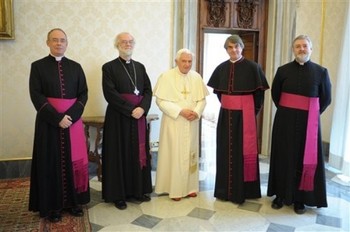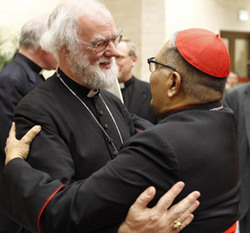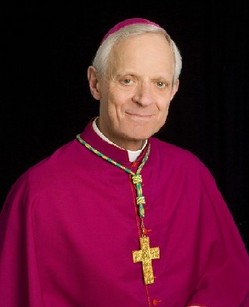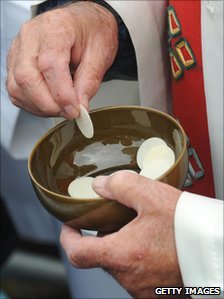The other day I made a post on this blog about a Canadian
woman priest giving Communion to a dog. A reader of the Communio blog, Lydia
wrote to me saying:
I am a priest in the Episcopal Church in the US.
The Anglican Communion does not have priestesses. I am sure that you know
that. Perhaps you are just being sarcastic.
Personally, I would rather have my
Church known for giving communion to a dog than for the fact that many of my
priests molested children, in countries all over the world, and that
my Bishops did all that they could to ignore complaints about the abuse,
to hide the problem, and to protect the offending clergy.
My response to Lydia
The dictionary defines a priestess as a female priest. It’s a perfectly good
English word; in fact, the Anglican C.S. Lewis wrote an essay called, “Priestesses
in the Church.” If the word “priestess” has a strangely non-Christian
sound, perhaps that is because in churches that claim apostolic succession,
there is no precedent for female priests. As Lewis pointed out, there have been
many religions with female priests (priestesses), but these religions are very
different from Christianity as it has been known for 20 centuries.
In any case,
the word “deaconess” is not considered offensive, so why should
“priestess” be so considered? If masculine imagery for divine transcendence
needs to be balanced by feminine imagery of divine immanence, why not say that
priest and priestess together represent the divine more fully, like Yin and
Yang? My impression is that many modern Anglicans (including women
clergypersons) think on those lines. So why fight about the sound of a word
when its substantive meaning is considered OK?
As for the Catholic Church being
“known for” molestation of children and minors: well, the Anglican
Church in Canada and Australia has been racked by similar problems, particularly
in residential schools, with some dioceses being nearly bankrupted. I am saddened
by the Anglicans’ troubles since the attacks on their schools is an indirect
form of anti-Christian persecution at the hands of a hostile state. As such,
this abuse hysteria threatens us all because it is premised on the assumption
that the sins of a few abusive clergy should be avenged on the entire Body of
Christ. In the case of any other group besides the clergy, this would be
considered unjust prejudice and overreaction.
Statistically speaking, Catholic
priests are no more likely to molest than ministers of other religions; it’s
just that we are a much larger church and that our dioceses are legally set up
as a corporation sole, thus inviting crippling lawsuits and lots of bad
publicity. That said, I do agree that we Catholics are not in a position to
cast any stones on the sexual abuse issue. And so this blog has not done so.
Gross
liturgical abuses and irreverence are a different sort of issue. These
liturgical-sacramental aberrations are public acts done in an official
capacity, not secret sins or obvious crimes. And, in fact, I do emphatically
criticize and abhor similar liturgical abuses among Catholics and wish that
more Catholic parishes had the reverence and decorum to be found in many
high-church Episcopal parishes. It’s not a matter of either side of the
Reformation divide being free of sin or failure: it’s just that without an
authoritative center of communion and teaching and practice, Anglicanism can’t
easily set any parameters for legitimate diversity within itself. And
Archbishop Williams himself would sadly admit that that is unfortunately the
case.
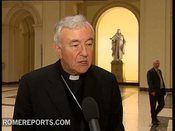 Increased attention is growing in the days that lead up to the anticipated creation of an Anglican Ordinariate in England. It’s hoped that the Ordinariate will be announced in early 2011. As you are aware, following the beatification of John Henry Newman 5 Anglican bishops declared that they’re resigning their positions in the Church of England in favor of entering into full communion with the Church of Rome. Andrew Burnham one of the bishops seeking communion with Rome set aside his mitre and crosier at the Mary altar, saying: “It is because it is a gift of the Holy Spirit, abiding in his Church, that I believe I must accept it and invite others to come with me on the journey.”
Increased attention is growing in the days that lead up to the anticipated creation of an Anglican Ordinariate in England. It’s hoped that the Ordinariate will be announced in early 2011. As you are aware, following the beatification of John Henry Newman 5 Anglican bishops declared that they’re resigning their positions in the Church of England in favor of entering into full communion with the Church of Rome. Andrew Burnham one of the bishops seeking communion with Rome set aside his mitre and crosier at the Mary altar, saying: “It is because it is a gift of the Holy Spirit, abiding in his Church, that I believe I must accept it and invite others to come with me on the journey.”